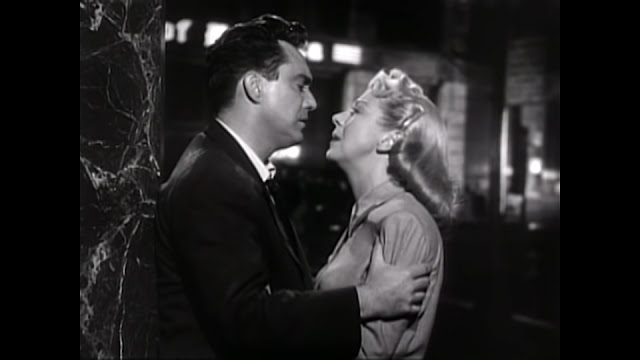The film noir genre produced many classics during its heyday. One of the most memorable still stands as D.O.A., and not just because the copyright lapsed!...
Frank Bigelow is a regular accountant, going out on the town for a few days, to get away from his clingy' partner, and to go drinking. The city is kind to him at first, but he wakes up the next morning feeling strange. A visit to the doctor reveals he has been fatally poisoned, and now with only a day or two left to live, Bigelow must discover who killed him and why...
D.O.A. begins in an arresting and now-famous scene, often imitated. The camera follows a man as he walks into a police station with purpose, until he reaches the chief's office. He'd like to report a murder-His own...
This immediately sets the fatalistic tone, and from then on the film is one big flashback (with a minimum of cheesy noir narration). What makes it so good is not only its delivery,
but the quality of the writing. There's enough humanity and meaning so
while the action may be downbeat, with a foregone conclusion, it's never
depressing.
D.O.A. is nice and short at only 84 minutes, but dense with detail. Despite knowing exactly what will happen to our lead, the movie's never dull, because there's still a wider mystery at play, and he may go at any moment. Not only must he expose his killer, but also save others from this fate, in a race against time. The reveal by the end is a little confusing, and whether or not you know what's even happening or who was responsible may vary, but at least the road getting there is worth it.
Frank Bigelow starts out as a bit of a cad. He's got a loving...secretary, and while things are very much official to her, he's reluctant to commit, and sees no problem with going on the town and flirting with other ladies. Things take a turn after his diagnosis, and his likeability increases. In a way it works better that he's an ass to start with, and it makes the struggle feel more real than if he were just a perfect saint.
Despite being an accountant, he makes for a believable lead as he fishes out the truth, and goes toe to toe with gangsters. His reaction to being poisoned is great too. He's naturally skeptical at first, but not unreasonable, as he immediately seeks a second opinion. It's here when he realises the truth of his situation, and runs for an entirely different reason.
Frank's girlfriend Paula is sweet, and well-rounded despite less screentime. She doesn't come across as desperate as she could've, thanks to good writing and acting. Mob boss Majak is a pragmatic villain, while his thuggish goon Chester is a psycho with a fixation on bellies. The overall villain isn't as interesting though, since we only find out who they are in the last few minutes, and by that point Frank's focused on making them pay rather than spending half an hour chatting.
The direction in D.O.A. is great, and highlights really well the desperate and disoriented mindset of the hero. Even if it's a bit on the nose at times, like when Frank collapses by a stall full of Life magazines.
The cast are very good. Edmond O'Brien impresses as the lead, and Pamela Britton makes the most of her role. Laurette Luez is a neat addition, bringing a bit of sultriness to the film. Luther Adler is charismatic as the mob boss, while Neville Brand could be terrifying or annoying to some as manic henchman Chester. Of particular note are some of the minor players, such as the doctors, and Roy Engel as the police chief. They get across a lot of gravity with their small but sombre roles.
D.O.A.'s legacy over 70 years later is strong, consisting of a few remakes of middling quality (including one from Australia!...starring two Americans...But one of them is Carolyn Jones!), homages in many other works, and ripoffs in a few others. As much of a cliche as it is to say, this original film is still the best, and is just as fresh now as it was back in 1950...











No comments:
Post a Comment